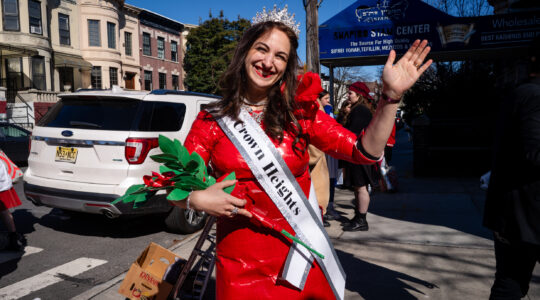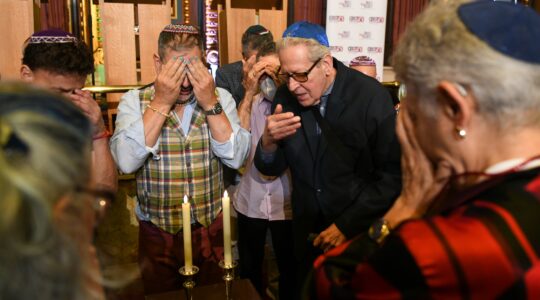For the last two years, thousands of Jewish women have joined marches across the country as part of the annual Women’s March, a protest that started as a grassroots effort in the wake of the 2016 presidential election and later grew into a national movement. But in the months leading up to this year’s march, Jewish women have struggled with the decision to join the demonstration as allegations of anti-Semitism have engulfed leaders of the Women’s March.
Sharon Separ, 60, of Arlington, Va., said she marched in Washington, D.C., for the first Women’s March in 2017 but is unlikely to march again this year. Though she supports the Women’s March platform, she felt uncomfortable when Linda Sarsour, a pro-BDS activist and one of the leaders of Women’s March Inc., spoke at the 2017 march.
“I’m 60 years old. I know Jewish women have stood next to black women for civil rights issues and for employment rights issues,” said Separ. “I don’t feel like they know the history of the relationship between Jewish women and black women.”
This latest bout of controversy, sparked in part by a report in Tablet magazine published in December, is not the first anti-Semitism related controversy for leaders of Women’s March Inc., the national organization that organized the first two marches in Washington D.C., and will organize the march there again this year.
Linda Sarsour, Tamika Mallory and Carmen Perez, three of the four women who make up the public face of the organization, have long been criticized within the Jewish and LGBTQ communities for their associations with Nation of Islam founder Rev. Louis Farrakhan, who has promoted anti-Semitic theories and used anti-LGBTQ rhetoric. Sarsour, who is Palestinian-American, has also been a polarizing figure in the Jewish community due to her vocal support for the movement to punish Israel for its West Bank policies through boycotts, divestment and sanctions.
The Tablet report alleged that leaders of the Women’s March, including Mallory and Perez, had used anti-Semitic rhetoric and excluded Jewish women from the leadership team from the beginning of the organization in November 2016. Vanessa Wruble, a Jewish activist who was involved in organizing the march shortly after the 2016 election, said Mallory and Perez told her she could not be a leader of the march because she is Jewish, a charge that Mallory and Perez deny.
Momentum had already been building against the leaders for months before the Tablet story, with actress and #MeToo activist Alyssa Milano calling for leadership reform and dozens of state and local Women’s March chapters and organizers calling on the leadership team to resign. Marches in New Orleans and Chicago have been cancelled due to questions about the march’s leadership, and the controversy has even divided feminist organizations outside the Jewish community. While Planned Parenthood said it would partner with the march again this year, the National Organization for Women (NOW) said it would discontinue its financial support of the march while encouraging its members to attend.
With two events scheduled in New York City, a rally organized by the local chapter of Women’s March Inc., and a march organized by the local group Women’s March Alliance, Jewish women in New York City are faced with an even more difficult choice. Women’s March Alliance, which organized the last two marches in New York City, first announced its march in October and has organized the last two marches in New York City. “We’ve always been completely independent and unrelated, as have all the sister marches, from Women’s March Inc., despite their claim that they’re national,” said Katherine Siemionko, founder and president of Women’s March Alliance. “It’s been a struggle to have to clean up after the mess of a competing organization.”
Now with the Jan. 19 march less than two weeks away, Agunda Okeyo, director of the local Women’s March Inc. affiliated chapter, said her group will be holding a rally downtown at the same time as the march. She expressed frustration with the response to the recent controversy and said her group has no connection to the Nation of Islam, anti-Semitism or anti-LGBTQ rhetoric. “I’m trying to figure out how to make people feel better, and I don’t really know how because we’re in this weird place where people have stopped listening,” said Okeyo. “We’re just not representative of what people think we’re representative of.”
The National Council of Jewish Women says it will not be a sponsor of Women’s March Inc. While NCJW’s New York City chapter is endorsing the Women’s March Alliance march in New York City, the organization is encouraging Jewish women across the country to march wherever they feel comfortable. “If you believe, as I do, that people can learn, change, grow, then you want to be in dialogue around these issues in order to change that narrative and that’s what we are doing,” said Nancy Kaufman, CEO of NCJW.
There are serious concerns about a couple of individuals; there are not serious concerns about the platform of the movement.
Kaufman pointed to a Nov. 20 apology issued by Linda Sarsour on behalf of the leaders of Women’s March Inc. “Every member of our movement matters to us — including our incredible Jewish and LGBTQ members. We are deeply sorry for the harm we have caused, but we see you, we love you, and we are fighting for you,” Sarsour wrote.
“There are serious concerns about a couple of individuals; there are not serious concerns about the platform of the movement,” said Kaufman of the allegations, noting that similar concerns were present in previous movements like the civil rights movement. “I think we have to differentiate and see what we can do to fix the situation and not make it worse.”
The Jewish Women’s Foundation of New York similarly did not endorse either event in New York City in a statement emailed to The Jewish Week. “The Jewish Women’s Foundation of New York supports women marching together as a positive embodiment of women’s empowerment. The divisiveness and pain that has come to characterize the 2019 Women’s March for many Jewish women centers on the leadership of Women’s March Inc. Whether one marches or doesn’t on January 19, there are many opportunities all year long to stand for the rights of women in the United States against anti-Semitism and misogyny,” said Jamie Allen Black, CEO of JWFNY, on behalf of the group.
Bend the Arc, a progressive Jewish advocacy organization, has also said it will continue its partnership with the national organization. While acknowledging the harm caused by the discussion about allegations of anti-Semitism among leaders of Women’s March Inc., Ginna Green, chief strategy officer of Bend the Arc, said in an email to The Jewish Week that the focus on claims of anti-Semitism was “effective at dividing a strong and growing movement when we need more than ever to be united.”
“The claims of anti-Semitism, particularly their focus on Louis Farrakhan, who is not part of the Women’s March and whose abhorrent views on Jewish and LGBTQ people are wholly outside those of the March, distract us from the rise of the violent white nationalism which is a far greater threat to our collective safety,” Green wrote. “We cannot afford to be either distracted or divided.”
We cannot afford to be either distracted or divided.
Zioness, a coalition of progressive, Zionist activists, announced that it would hold teach-ins in New York City, Washington, D.C., and Los Angeles in response to the recent controversy. The teach-ins will feature leaders of local Women’s March chapters that have dissociated from the national Women’s March Inc., including the founder of the New York City-based Women’s March Alliance.
Naomi, 18, a college student from Nashville who asked that her last name not be used, said she is “definitely hurt” by the anti-Semitic rhetoric used by leaders of the Women’s March as reported in articles in Tablet and The New York Times. She participated in the march in Nashville last year but isn’t sure if she will participate again this year. “I’m kind of conflicted about it,” she said. “The fact that the national leaders are involved in such blatantly anti-Semitic statements makes me feel super iffy about it.”
The New York Jewish Week brings you the stories behind the headlines, keeping you connected to Jewish life in New York. Help sustain the reporting you trust by donating today.




